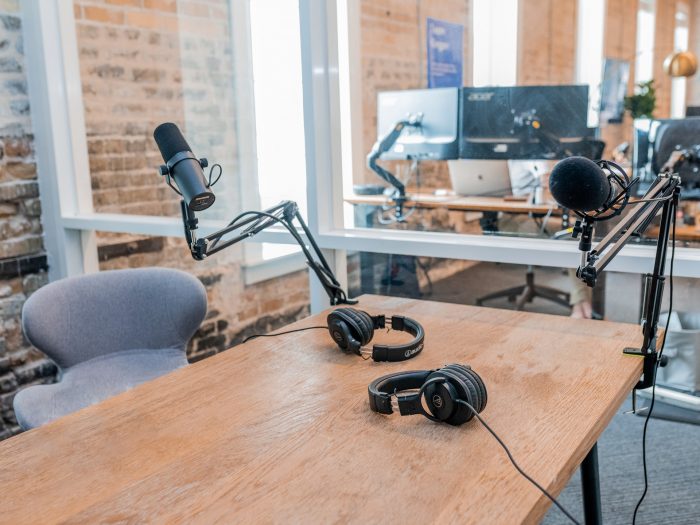You can’t go five minutes these days without somebody mentioning this new amazing podcast they’ve started listening to and all of the amazing things it has helped them to learn.
Whether it’s a news and current affairs discussion, storytelling, ranking popular books and media, there’s a podcast market for absolutely everything you could think of, and that includes your business.
It might sound as simple as picking a topic and talking about it into a microphone, but there’s actually a lot of planning and preparation required when it comes to making a quality podcast.
Here are the top five pointers we would offer to those looking to start a podcast. Suitable for beginners with little to no experience, or those who are already ‘a friend of the pod’, so to speak, but seeking advice to improve their listener’s experience.
Tip #1 – Find Your Niche and Stick to It!
The easiest way to kick off your new podcast from the ground up is to determine what your subject matter is going to be. Of course, this can range from being general to highly specific, depending on the nature of your business, and that’s okay!
It’s essential to ask yourself why you want to start a podcast — is it as a marketing strategy for your business, or perhaps relating to the nature of your business as a way of advising and communicating with other people in your industry?
Regardless of the reason, it’s crucial that the niche you’re aiming to podcast about is wide and versatile enough for you to create regular content that is entertaining, engaging, and most importantly, avoids repetitiveness.
Likewise, you need to have a certain level of enthusiasm for and understanding of your chosen subject; it’s no use making a podcast about something if you don’t care about it! Your audience will be able to tell if your passion is fake, too.
Tip #2 – What’s in a Name? Everything
Perhaps the simplest way to get an instant reaction from a potential audience member is by coming up with the perfect name, which requires some thought — you may already have some ideas in mind, but let’s consider the following, first.
A punny title is a simple way to hook somebody’s interest; these names are only somewhat connected to the subject, for instance, ‘Queers Gone By’ parodies the popular phrase ‘Years Gone By’ but doesn’t actually reveal the subject entirely.
Clever and witty puns are effective, but exercise caution: if you’re growing your audience from nothing, what sounds hilarious and totally related to your business in your own head might not make any sense to a potential listener.
An easy way to avoid this is to explain the purpose of your podcast at the start of every episode — as the folks from Queers Gone By do — so that even if a listener jumps in halfway through your season, they’ll understand what’s going on.
Keep your title short, sweet, and snappy, as it will be constantly repeated, but most importantly, make sure it conveys at least partially what the general theme of your podcast actually is.

Tip #3 – Making Money Means Advertisers
Of course, this is only going to come a little later, once you’ve laid the groundwork and garnered yourself a crop of listeners, but if you’re wanting to make money from your podcast, then advertisers are the quickest way to do so.
A great way to include some affiliate marketing in your podcast is to reach out to others in the same field of business and express your interest in featuring one of their products or services in a set number of episodes.
If you have the listener base and a good enough niche to pique their interest, there’s no reason why you won’t be able to start profiting from your podcast, especially if you follow the rest of our advice!
Tip #4 – Equipment, Equipment, Equipment
Yeah, you could technically record a podcast on your phone and upload it through your computer, but it isn’t going to be a high-quality audio file, and your listeners will be turned off by your lack of care and attention to detail.
Microphones are pivotal in a successful podcast. If you don’t use a good one, or you pick the wrong kind for your recording setting, then you’ll be difficult to hear and understand, as well as experiencing feedback and other distracting sounds.
You could go for a condenser mic, suitable for quieter environments like private studios or podcasts that record from home, as background noise is likely to be at a minimum. Their extra sensitivity will offer a clearer resonance to your voice, too.
On the other hand, if you need to record outside, or plan to host multiple guests and visitors, you’ll be able to pick up vocals and drown out any unnecessary sounds much better with a dynamic mic setup.
Decent recording and editing software are also necessary to achieve the results you’re looking for, as illustrated by the team over at Podcast How To in their handy article about podcasting for beginners.
Tip #5 – Continuity
It might sound a little too simple, but continuity is the key to success. One episode does not a famous, popular podcast make: you need to continue to put out content on a regular basis, trying to follow the same schedule as often as possible.
Audiences much prefer it when a podcast’s new episodes come out at the same time, following a pattern, as then they know when to expect fresh content and can look forward to it — it also means they’re more likely to successfully tune in!
Updating your podcast sporadically and failing to stick to subjects that pertain to your niche is a quick and easy way to lose subscribers, as they will choose to spend their time listening to podcasts that meet their personal interests continuously.
If you say you are going to upload at a certain time, then stick to it. If you promise to feature a particular guest in an upcoming episode, make sure you can fulfill that promise. A happy listener keeps coming back!
Find a Home-Based Business to Start-Up >>> Hundreds of Business Listings.

















































